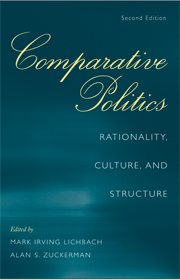Book contents
- Frontmatter
- Contents
- Contributors
- Preface and Acknowledgments
- 1 PARADIGMS AND PRAGMATISM
- 2 THINKING AND WORKING IN THE MIDST OF THINGS
- 3 ADVANCING EXPLANATION IN COMPARATIVE POLITICS
- 4 STRONG THEORY, COMPLEX HISTORY
- 5 RECONSIDERATIONS OF RATIONAL CHOICE IN COMPARATIVE AND HISTORICAL ANALYSIS
- 6 CULTURE IN COMPARATIVE POLITICAL ANALYSIS
- 7 RESEARCHING THE STATE
- 8 AN APPROACH TO COMPARATIVE ANALYSIS OR A SUBFIELD WITHIN A SUBFIELD?
- 9 THE GLOBAL CONTEXT OF COMPARATIVE POLITICS
- 10 COMPARATIVE PERSPECTIVES ON CONTENTIOUS POLITICS
- 11 CITIZENSHIP IN DEMOCRATIC POLITICS
- 12 NESTED CITIZENS
- 13 BACK TO THE FUTURE
- 14 THE COMPARATIVE POLITICAL ECONOMY OF THE WELFARE STATE
- 15 MAKING CAUSAL CLAIMS ABOUT THE EFFECT OF “ETHNICITY”
- References
- Author Index
- Subject Index
- Titles in the series
6 - CULTURE IN COMPARATIVE POLITICAL ANALYSIS
Published online by Cambridge University Press: 05 June 2012
- Frontmatter
- Contents
- Contributors
- Preface and Acknowledgments
- 1 PARADIGMS AND PRAGMATISM
- 2 THINKING AND WORKING IN THE MIDST OF THINGS
- 3 ADVANCING EXPLANATION IN COMPARATIVE POLITICS
- 4 STRONG THEORY, COMPLEX HISTORY
- 5 RECONSIDERATIONS OF RATIONAL CHOICE IN COMPARATIVE AND HISTORICAL ANALYSIS
- 6 CULTURE IN COMPARATIVE POLITICAL ANALYSIS
- 7 RESEARCHING THE STATE
- 8 AN APPROACH TO COMPARATIVE ANALYSIS OR A SUBFIELD WITHIN A SUBFIELD?
- 9 THE GLOBAL CONTEXT OF COMPARATIVE POLITICS
- 10 COMPARATIVE PERSPECTIVES ON CONTENTIOUS POLITICS
- 11 CITIZENSHIP IN DEMOCRATIC POLITICS
- 12 NESTED CITIZENS
- 13 BACK TO THE FUTURE
- 14 THE COMPARATIVE POLITICAL ECONOMY OF THE WELFARE STATE
- 15 MAKING CAUSAL CLAIMS ABOUT THE EFFECT OF “ETHNICITY”
- References
- Author Index
- Subject Index
- Titles in the series
Summary
INTRODUCTION
This chapter argues that culture is important to the study of politics because it provides a framework for organizing people's daily worlds, locating the self and others in them, making sense of the actions and interpreting the motives of others, for grounding an analysis of interests, for linking identities to political action, and for predisposing people and groups toward some actions and away from others. Culture does these things by organizing meanings and meaning-making, defining social and political identity, structuring collective actions, and imposing a normative order on politics and social life.
To examine how culture operates, we must approach it through the formal and informal verbal and nonverbal narratives about the social and political worlds that people who are part of a culture share. However, before I discuss culture as a useful, and underused, perspective in comparative politics, three caveats are in order. First, to be useful, culture cannot be defined so broadly as to include all behaviors, values, and institutions lest it lose any distinctiveness and explanatory power. Second, cultures are not formal units with delimited clear borders and membership cards; nor are they fully integrated internally or always internally consistent. Rather, their boundaries, integration, and consistency are regularly subject to contestation. Third, the effects of culture on collective action and political life are generally indirect, and to fully appreciate the role of culture in political life, it is necessary to inquire how culture interacts with, shapes, and is shaped by interests and institutions.
- Type
- Chapter
- Information
- Comparative PoliticsRationality, Culture, and Structure, pp. 134 - 161Publisher: Cambridge University PressPrint publication year: 2009
- 15
- Cited by



